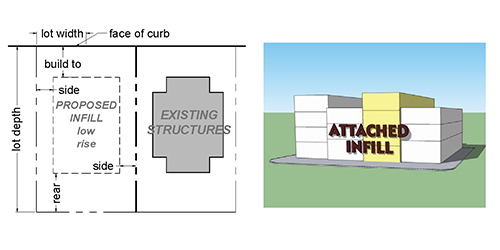Development review process
One area a municipality can specifically impact overall housing costs is through their development review process. Specifically a municipality can ensure their ordinances are modern, consistent, and allow for flexibility to encourage better-planned communities. Further, they should also be encourage development representing households of all income levels, ages, and sizes. Ensuring a clear and timely review process helps in controlling costs, as it reduces uncertainty and can improve overall project financing.
Municipal ordinances
Municipal zoning and subdivision and land development ordinances are living documents, and they should be regularly reviewed and amended as necessary to ensure they are consistent with contemporary planning and building processes and trends. Specific attention should be given to definitions and efforts made to ensure all defined terms are clear and unambiguous to avoid confusion and conflicts. Further, municipalities should ensure all defined terms are consistent between various ordinance chapters as to not create conflicts in their interpretation. This consistency can result in cost savings as fewer plan revisions and reviews may be required to address outdated regulations and/or differences in how definitions may be interpreted.
Digital submission
Most municipalities require plan submissions be printed in a large format with sufficient copies for municipal review by staff, outside consultants, the Planning Commission, and the governing body. Consideration could be given to not requiring paper copies until final approval when they are required for recording at the Recorder of Deeds. Digital submissions could be required instead throughout the review process as the plan is refined and brought into conformance with all applicable municipal regulations. Digital submissions can more efficiently be forwarded to outside review agencies and potentially reduce the amount of time needed for review as well as printing costs associated with the project.
Fees
Any fees charged as part of the development review process should be "reasonable and necessary charges" as defined in the Municipalities Planning Code.11 The municipality should annually review and confirm with their solicitor that any fees be charged are "reasonable and necessary" as excessive fees can legally be challenged by the applicant and refunded. A legal challenge to excessive fees can be both costly and time consuming as it goes through the appeal process defined in the municipal code.
Further fee related costs are incurred from municipal consultants such as the municipal engineer, planner, solicitor, etc. Although these fees are not levied by the municipality, they are still subject to the limitations on fees as prescribed by the MPC. Consideration should be given to minimizing these costs to the greatest protractible extent, and ensuring these fees are "reasonable and necessary" as defined by the MPC. It is essential the municipality regularly review fees charged by consultants as to ensure they are appropriate as defined by the MPC to avoid any potential challenges to them by applicants.
Shortening the review process
Depending on the type of project being proposed and whether or not it requires zoning amendments and/or additional municipal approvals (i.e. conditional use, special exception, zoning relief, etc.), the time it takes to gain project approval can impact overall costs. This is the case as increased approval times can impact overall project financing as it increases the overall risk a lender may be willing to take. The extended project timeline that ensues can result in additional cost burdens that are passed on to the buyer.
Municipalities should consistently review their allowable uses and consider making more residential uses by-right when practicable and aligning with overall municipal goals. By-right developments have a significantly quicker review period, which can reduce overall risk and result in more manageable financing terms from construction lenders.
11. Section 503(1) of the MPC as it relates to fees charged as part of the land development process states: "Review fees may include reasonable and necessary charges by the municipality's professional consultants for review and report thereon to the municipality. Such review fees shall be based upon a schedule established by ordinance or resolution. Such review fees shall be reasonable and in accordance with the ordinary and customary charges for similar service in the community, but in no event shall the fees exceed the rate or cost charged by the professional consultant for comparable services to the municipality for services which are not reimbursed or otherwise imposed on applicants. Fees charged to the municipality relating to any appeal of a decision on an application shall not be considered review fees and may not be charged to an applicant."





